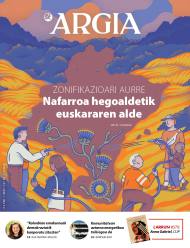Euskera, politics, science and fable
We human beings look to science when we need to know our reality precisely in any field and tackle problems effectively. This has been the case in human history, and it should be today. But it is common that the application of science and the consequences resulting from it obscure and even marginalize the different powers, when their conventions go another way. In such cases, science humiliates us and, instead of its clear and precise consequences, prioritizes and imposes anti-scientific fabulations. That is what is happening to us. When applied science, that is, scientific sociolinguistics offers concrete affirmations, from different powers invent the so-called “political sociolinguistics” and offer us fables about the situation and future of the Basque Country.
Four years ago, the Department of Linguistic Policy of the Basque Government published the book "Euskararen Historia del Euskera", composed of works by several experts and, therefore, with the intention of placing it in the scientific sphere. But in the conclusion section, one of these experts wrote: “It can be said, as never before, that the future of language depends on the present generations: if they want, they will use it.” This statement is certainly scientifically false, in the confidence that the Government, despite its contribution, will mitigate and beautify the results of its Language Policy. Because scientific sociolinguistics has made it clear that the future of Euskera depends on complex and strong factors, but not only on Basque speakers. Although the Vasco-speakers want to use Euskera, we cannot use it in most cases, because now and here are determinant factors against its use that hinder the free use of Euskera.
Bilingualism is the ideology of oppressive linguistic nationalism, a simple trick to replace Euskera
But what is the situation in the Basque Country now and here? What does scientific sociolinguistics say? Analyzing the status and use of the Basque Country, the regulated status that is called bilingualism is a fable, and not the scientific expression, since the Spanish (both Spanish and French) and the Basque Country are not in a balanced situation, since both dominate the Basque country by law and by use. The only essential are Spanish in Basque Country and not Basque. Bilingualism is the ideology of oppressive linguistic nationalism, a simple trick to replace the Basque.
The worst thing is that, in the field of Basque politics itself, this ideology has been assimilated by so-called nationalist parties, which speak of “plurilingualism” and “cultural plurality”, embracing fabulation instead of scientific study. Meanwhile, this current autonomic linguistic policy, through this “bilingualism”, facilitates the transformation of the whole society into Spanish and feeds new generations who do not feel Euskaldunes. For the benefit of the Spanish and French systems, Spanish and French become “natural” languages among young people.
Science marks very different alternatives. We must reverse the social situation of the Basque Country in the situation we live in. In the Basque areas we must make Euskera the main language, doing what is necessary for it. To become the main Basque polysystem, we have to unlearn Spanish. If we want to put science in favour of the Basques, at least, we need a very different language policy.
Bidali zure iritzi artikuluak iritzia@argia.eus helbide elektronikora
ARGIAk ez du zertan bat etorri artikuluen edukiarekin. Idatzien gehienezko luzera 4.500 karakterekoa da (espazioak barne). Idazkera aldetik gutxieneko zuzentasun bat beharrezkoa da: batetik, ARGIAk ezin du hartu zuzenketa sakona egiteko lanik; bestetik, egitekotan edukia nahi gabe aldatzeko arriskua dago. ARGIAk azaleko zuzenketak edo moldaketak egingo dizkie artikuluei, behar izanez gero.
Ez dezazuela lotura hau Ezkiotik bilatu, ez eta Altsasutik ere, are gutxiago Ebro ibaia Castejonetik zeharkatuz. Euskal Yaren eta Nafarroako AHTaren arteko lotura, edo hobeto esanda, loturak, dagoeneko errealitate bat dira. Pluralean dauden lotura horiexek dira kezkatu beharko... [+]
Ez atera zalapartarik, ez konfrontatu, ez biktimizatu... eta obeditu. Subjektu zapaldu gisa, kasu honetan euskaldun gisa, mintzo gara, zenbatetan entzun behar izan ditugu halakoak? Ironiaz, honelaxe esan zuen, duela bi urte, Euskaltzale Independentiston Topaketan, Amets... [+]
Aurten "Israel Premier Tech" txirrindularitza talde israeldarra ez da Lizarraldeko Miguel Indurain Sari Nagusia lasterketara etorriko. Berri ona da hori Palestinaren askapenaren alde gaudenontzat eta munstro sionistarekin harreman oro etetea nahi dugunontzat, izan... [+]
Intsumituek denbora luzez egindako borroka gogorra eta mingarria izan zen, baina irabazi zuten, eta garaipen hura behin betikoa izango zela uste genuen, atzera bueltarik gabea. Baina badirudi, politikari batzuen ahotik aterata, eskalada militaristari gorazarre egin eta berriz... [+]
Danimarkatik iritsi zaigu berria: 400 urtez estatuak eskainitako zerbitzua etengo du PostNord enpresa publikoak, eta eskutitzak banatzeari utziko dio 2025 urtea amaitzean. Gobernuak adierazi du enpresa publikoak negozioa paketeak banatzera bideratuko duela. Bi arrazoi eman ditu... [+]
“Hondakinik ez platerean!”. Hori zen kontsigna gure txikitako otorduetan. Janariak zeozer sakratu bazukeen, batez ere ogiak; lurrera erori eta, jasotakoan, musua eman behar zitzaion. Harik eta adin zozoan mamia baztertzeko moda etorri zen arte, lodiarazten zuelakoan... [+]
Zenbait estatistikak berretsi dute begiak hondar urteotan ikusten ari zirena: gimnasioak (eta estetika-zentroak eta nolako-edo-halako-terapia eskaintzen duten negozioak) nabarmen ugaldu dira gurean. EITBk plazaratutako datu bat emateko: EAEn 2010-2019 urteen bitartean, zazpi... [+]
Topatu eta topa! Tipi-tapa, elkarrekin ekin eta, bidea, eginean egin aurrera. Mahaiak, aulkiak, koadernoak eta boligrafoak, platerak, konfidentziak, tragoak eta ahotsak, eskuak, ideiak eta barreak, borrokarako besarkada gozoak. Txistulariak bileran, erraldoiak lasterka eta... [+]
Hezkuntzari buruzko legediak, Ekonomia Lankidetza eta Garapenerako Erakundearen eta planetako jaun eta jabeen aginduei jarraituz, ikasleek ikasketa etapa bakoitzaren amaieran “irteera-profil” jakin bat izatea bilatzen du. Ez pentsa profila zerbait itxia eta bukatua... [+]
Martxoaren 14an Donald Trumpek agindu exekutibo bat sinatu zuen, hainbat berri agentziak jasotzen duten diru kopurua asko murrizteko. Kaltetuetako bat United States Agency for Global Media (USAGM) izan zen eta, ondorioz, Voice of America (VOA), Radio Free Europe/Radio Liberty... [+]
Orain dela 20 bat urte, berrikuntzaren inguruan master bat egin nuen. Bertaraturiko gonbidatu batek esan zigun gizakion historian berrikuntza teknologikoaren eragile handiena gerra izan zela. Gerra, halaber, eragile handia da botere harremanen berrikuntzan.
Berrikuntzaz ari... [+]
Zer esango zenioke Palestinako aktibista bati aurrez aurre izango bazenu? Ni mutu geratu nintzen Iman Hammouri nire herrian bertan aurkeztu zidatenean. Eskerrak andre nagusi bat gerturatu zitzaigula eta solaskide roletik itzultzailearenera pasa nintzela.
Palestinako Popular... [+]
Punto Bobo liburuaren irakurketan murgilduta, Itxaso Martin Zapirain egilearen Eromena, Azpimemoria eta Isiltasunak Idazten ikerketa lanean sentitu nuen egiazkotasun eta maila etikoarekin egin dut berriz ere topo. Eta hortaz, hara bueltatu. “Oihu izateko jaio zen isiltasun... [+]
Dirudienez, Euskal Herrian migrazioa arazo bilakatu da azken bi hamarkadetan. Atzerritarrez josi omen dira gure lurrak. Gure kultura arriskuan omen dago fenomeno “berri” horren ondorio. Lapurretak, bortxaketak, liskarrak… Bizikidetza arazo horiek guztiak... [+]



















